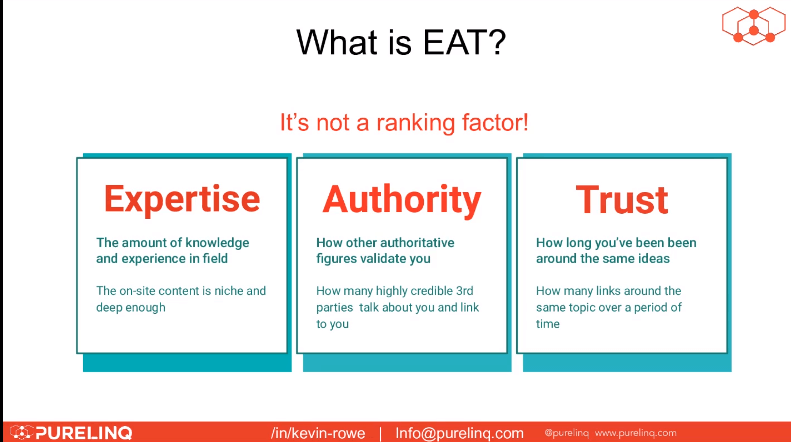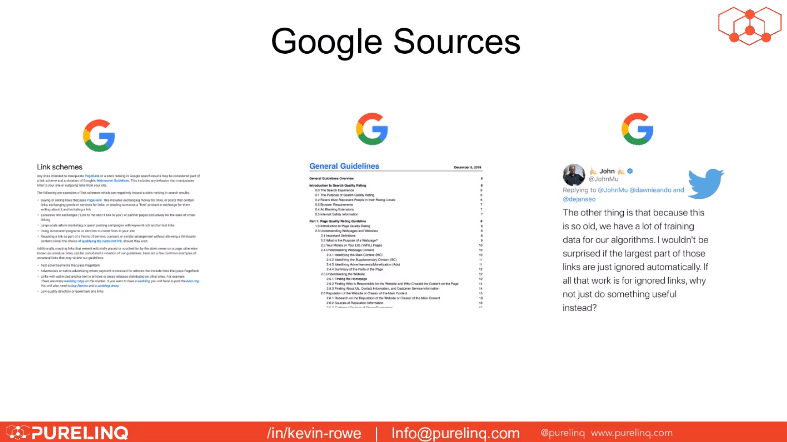Google’s principle of E-A-T — which stands for expertise, authority, and trustworthiness — is the search engine’s way of determining the value of content on the web.
But, what does it mean for content to reflect expertise, authority, and trustworthiness?
“Expertise, for me, is the amount of knowledge you have in a field,” said Kevin Rowe, founder and CEO of PureLinq, in a recent webinar. “You build more expertise the longer you’ve been in a field.”
“Authority is how other authoritative figures validate you — this is reflected through authoritative links. And trust is [expertise and authority] over time,” he added.

When most marketers consider E-A-T signals, they often focus their efforts on creating high-quality content. And while this is one of the most important factors, these professionals could be missing out on potential ranking signals from authoritative backlinks.
According to Rowe, considering E-A-T when building links to your site — and generating content — is a great way to improve rankings, especially for those in the YMYL (your money, your life) space.
What Google says about E-A-T and YMYL
Google offers marketers a lot of resources for marketers looking to improve their sites’ E-A-T signals, says Rowe. Whether it’s documentation such as the General Guidelines or communication on social platforms such as Twitter, these resources can provide additional context into how the search engine determines site authority, expertise, and trustworthiness.
The information suggests Google relies heavily on the concept of E-A-T when evaluating YMYL content. According to the Guidelines, it’s “possible to have everyday expertise in YMYL topics.” This can be presented in the form of forum posts, articles detailing one’s personal experiences, or any other content that seeks to give searchers advice.

However, despite all of the resources available, Google doesn’t actually offer specific strategies about how to improve E-A-T or even the way its algorithms work in conjunction with it.
“They give a lot of information about how they’d like the search engine to work, but it doesn’t always work that way,” Rowe said. “So, we have to use testing and analysis to understand the cause and effect relationships.”
E-A-T isn’t an update or algorithm; it’s a principle to follow when optimizing your site in general. So, marketers should use Google’s guidelines and documentation to inform their testing and optimization efforts to better adhere to this principle.
Get the daily newsletter search marketers rely on.
How to establish E-A-T with link building and content
While there aren’t straightforward steps from Google for improving E-A-T, marketers can work on enhancing the quality signals for their sites through strategic link building and content creation efforts.
“It’s all about how authoritative your links are and how expert-driven your content is,” said Rowe.
Rowe highlighted three ways marketers could begin sending higher E-A-T signals.
Create subject matter expert content. Write content from a position of expertise. Your pieces should be the go-to resources for readers interested in a given subject. If you’re not an expert in the area, hire someone who can create this content for you.
Message sculpting. Focus on the needs of the audience you’re writing for. People searching for YMYL content want relatable messages that speak to their personal situations, so make sure your writing reflects this.
Identify link building opportunities. Look for reputable, relatable sites and start pitching your content to them. A great resource Rowe recommends is HARO, which connects subject matter experts with journalists who publish content in those areas.
High-quality content and links from authoritative sources are the foundation of E-A-T. Rowe highlighted how these aspects are inextricably intertwined: “Expertise, authority, and trust are about the amount of knowledge and content shared on [and from] your site. It’s about who you are, who’s writing the content, and what other people think about it.”
Watch this webinar presentation at Digital Marketing Depot.
New on Search Engine Land
from WordPress https://ift.tt/Ud4reSP
via IFTTT


0 Commentaires